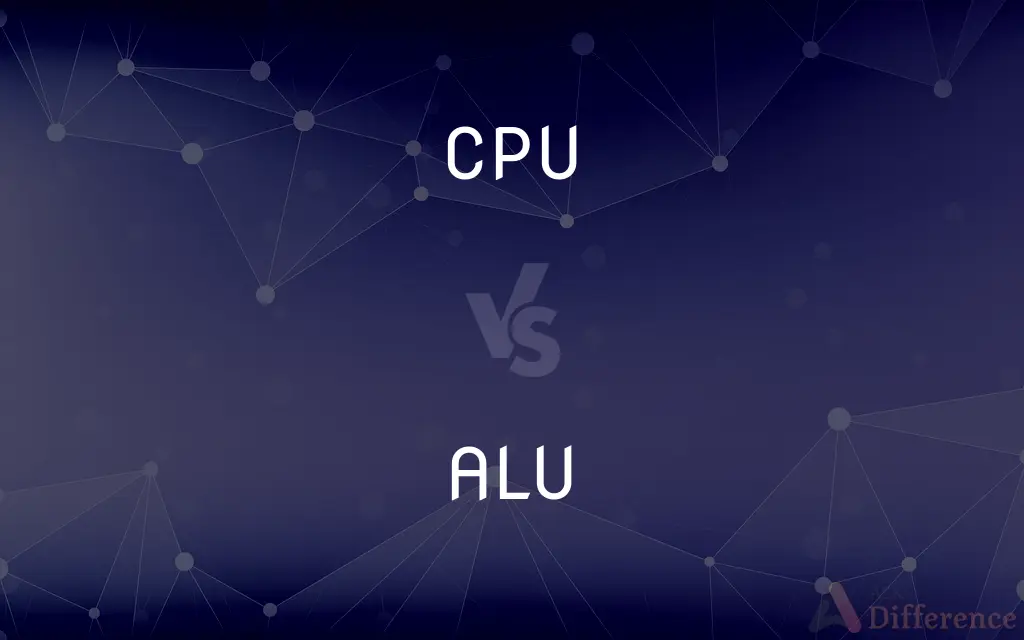CPU vs. ALU — What's the Difference?
By Tayyaba Rehman & Fiza Rafique — Published on October 10, 2023
The CPU is the computer's main processor, while the ALU performs arithmetic and logical operations.

Difference Between CPU and ALU
Table of Contents
ADVERTISEMENT
Key Differences
The CPU, or Central Processing Unit, is the primary component of a computer responsible for executing instructions of a computer program. It orchestrates the operation of the entire computer system, making decisions about which processes get priority and when.
In contrast, the ALU, which stands for Arithmetic Logic Unit, is a critical part of the CPU that specifically handles arithmetic and logical operations. The CPU might be thought of as the brain of the computer, and the ALU would be one of its essential organs, enabling it to think and reason.
Every time a computer needs to perform a mathematical operation, such as addition, subtraction, or even more complex tasks, it's the ALU that gets to work. Meanwhile, the CPU ensures that these tasks are carried out in the right order and that the results are sent to the appropriate place.
While the ALU is integral to the CPU's operation, the CPU also contains other components. These include the control unit, which oversees the flow of data, and registers, which store temporary data. The ALU, on the other hand, remains focused on its specific task of processing arithmetic and logic operations.
To summarize, while the CPU is the command center overseeing and processing various tasks within a computer, the ALU is a vital component within the CPU that specifically tackles arithmetic and logical functions.
ADVERTISEMENT
Comparison Chart
Function
Executes instructions of a computer program.
Performs arithmetic and logical operations.
Composition
Contains ALU, control unit, and registers.
Is a component within the CPU.
Task Variety
Handles a wide range of tasks including instruction fetching.
Focused on arithmetic and logic tasks.
Relationship
Overarching unit in computer processing.
A subset of the CPU.
Analogy
The brain of the computer.
An essential organ within the brain.
Compare with Definitions
CPU
The brain of a computer system.
A faster CPU can boost overall computer performance.
ALU
Evaluates and produces results for arithmetic functions.
For multiplication tasks, the ALU is essential.
CPU
Orchestrates other computer components.
The CPU interacts with memory and storage to execute tasks.
ALU
Processes specific operations in binary computing.
In binary calculations, the ALU plays a pivotal role.
CPU
Processes data based on program instructions.
The latest games require a powerful CPU for optimal gameplay.
ALU
A critical component within the CPU.
A computer's arithmetic tasks are managed by the ALU.
CPU
The primary processing unit of a computer.
The CPU interprets and executes program instructions.
ALU
Handles tasks like addition, subtraction, and logic checks.
The ALU determines if one value is greater than another.
CPU
Responsible for task scheduling and execution.
The CPU ensures tasks run smoothly and efficiently.
ALU
Performs mathematical and logical operations.
The ALU quickly calculates the sum of two numbers.
CPU
The central processing unit, that part of the electronic circuitry of a computer in which the arithmetic and logical operations are performed on input data, which are thereby converted to output data; it is usually located on the mainboard, or motherboard, of a computer. The CPU and the memory form the central part of a computer to which the peripherals are attached. Most personal computers as of 1998 had only one CPU, but some computers may have more than one CPU.
CPU
(computer science) the part of a computer (a microprocessor chip) that does most of the data processing; the CPU and the memory form the central part of a computer to which the peripherals are attached
Common Curiosities
What does CPU stand for?
CPU stands for Central Processing Unit.
What's the primary function of the ALU?
The ALU handles arithmetic and logical operations.
Which is more complex, the CPU or the ALU?
The CPU is more complex as it encompasses the ALU and other components.
And ALU?
ALU stands for Arithmetic Logic Unit.
Is the ALU separate from the CPU?
No, the ALU is a component within the CPU.
Why is the ALU important?
The ALU is crucial for performing calculations and logical decisions essential for software execution.
What happens inside the ALU?
The ALU performs mathematical operations and logical comparisons.
Can I upgrade just the ALU in my computer?
Typically no, the ALU is integrated into the CPU, so you'd upgrade the CPU.
What does the CPU do?
The CPU executes instructions of a computer program and manages tasks.
Does every computer have a CPU and ALU?
Yes, every computer needs a CPU, and every CPU contains an ALU.
Is the CPU the same as the processor?
Yes, the terms "CPU" and "processor" are often used interchangeably.
Do both CPU and ALU get hot during operation?
Yes, both generate heat, especially the CPU, which is why cooling mechanisms are vital.
Can a CPU function without an ALU?
No, the ALU is essential for the CPU to process many tasks.
Do all CPUs have only one ALU?
While many CPUs have one ALU, some modern processors have multiple ALUs for parallel processing.
Is the ALU involved in web browsing?
Yes, the ALU is involved in many tasks, including calculations required during web browsing.
Share Your Discovery

Previous Comparison
GDP vs. GNI
Next Comparison
Gene Expression vs. Gene RegulationAuthor Spotlight
Written by
Tayyaba RehmanTayyaba Rehman is a distinguished writer, currently serving as a primary contributor to askdifference.com. As a researcher in semantics and etymology, Tayyaba's passion for the complexity of languages and their distinctions has found a perfect home on the platform. Tayyaba delves into the intricacies of language, distinguishing between commonly confused words and phrases, thereby providing clarity for readers worldwide.
Co-written by
Fiza RafiqueFiza Rafique is a skilled content writer at AskDifference.com, where she meticulously refines and enhances written pieces. Drawing from her vast editorial expertise, Fiza ensures clarity, accuracy, and precision in every article. Passionate about language, she continually seeks to elevate the quality of content for readers worldwide.












































